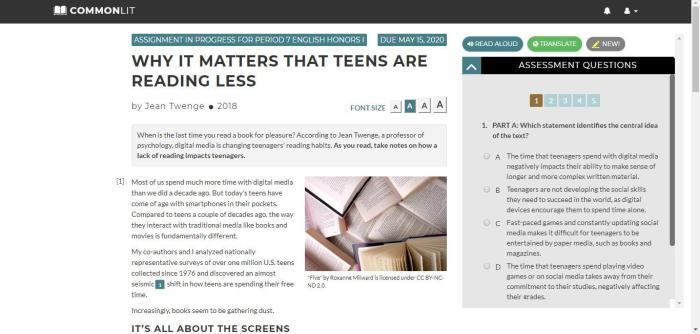Why it matters that teens are reading less CommonLit answers is a pressing concern that warrants attention. As screen time and digital distractions proliferate, the decline in reading habits among teenagers has become increasingly evident, raising questions about its consequences for their cognitive development and overall literacy skills.
This decline is not merely a matter of personal preference; it has significant implications for teens’ academic performance, critical thinking abilities, and future opportunities. Exploring the reasons behind this trend and its potential impact is crucial to addressing this issue and fostering a love of reading among the younger generation.
Declining Reading Habits among Teenagers: Why It Matters That Teens Are Reading Less Commonlit Answers

In recent years, a worrying trend has emerged among teenagers: a decline in reading habits. Research indicates that teens today spend significantly less time reading than previous generations. A 2020 study by the National Endowment for the Arts found that only 27% of teenagers read for pleasure on a daily basis, down from 40% in 2002.
This decline in reading is attributed to several factors. One major factor is the rise of screen time. Teens today spend an average of 7 hours per day on screens, consuming content such as social media, videos, and games. This screen time often comes at the expense of reading time.
Another factor contributing to the decline in reading is the changing nature of homework. In the past, homework often involved reading assignments. However, today, homework is more likely to involve online research, projects, and presentations, which may not require as much reading.
Consequences of Limited Reading, Why it matters that teens are reading less commonlit answers
The decline in reading among teenagers has serious consequences. Reading is essential for cognitive development and academic success. It helps to improve critical thinking skills, vocabulary development, and overall literacy skills. Studies have shown that students who read regularly perform better on standardized tests and have higher grades.
Reading also has a significant impact on personal growth. It fosters imagination, empathy, and cultural understanding. Literature can broaden perspectives, shape personal values, and contribute to emotional intelligence and social development.
The Importance of Reading for Personal Growth
Reading is not just about acquiring knowledge. It is also about exploring new worlds, developing empathy, and understanding oneself. Literature can help teens to connect with their emotions, understand different cultures, and develop a sense of identity.
Reading also contributes to emotional intelligence and social development. By reading about characters in different situations, teens can learn how to cope with difficult emotions, resolve conflicts, and build healthy relationships.
Addressing the Issue
The decline in reading among teenagers is a serious problem that needs to be addressed. There are several strategies that can be used to encourage reading among teens.
One important strategy is to make reading more accessible. This can be done by providing free or low-cost access to books, e-books, and audiobooks. It is also important to create reading spaces that are comfortable and inviting.
Another strategy is to make reading more relevant to teens. This can be done by choosing books that are interesting and engaging. It is also important to connect reading to real-world experiences.
Finally, it is important to model reading behavior. Teens are more likely to read if they see their parents and teachers reading. It is also important to talk about books with teens and share your own reading experiences.
Q&A
What are the primary factors contributing to the decline in reading habits among teens?
The proliferation of screen time and digital distractions, including social media, video games, and streaming services, has significantly reduced the time teens spend reading.
How does limited reading impact teens’ cognitive development?
Reading less can hinder the development of critical thinking skills, vocabulary, and overall literacy proficiency, which are essential for academic success and lifelong learning.
What are the long-term consequences of teens reading less?
Limited reading can limit future opportunities, as it can affect academic performance, career prospects, and overall intellectual development.


